|
|
||||
| home > architetture | ||||
| FLORENCIA
PITA. Pulse: Tendril Formations |
||||
| Florencia
Pita recently realized a fascinating site-specific installation in the
SCI-Arc (Southern California Institute of Architecture) Gallery in Los
Angeles, California. Pulse: Tendril Formations presents a very
complex structure, formulated through mathematical computation, where
the proliferation of layers of single curvature give form to a three-dimensional
pattern. Color and material are manipulated to produce spatial effects,
and the SCI-Arc gallery is transformed into an entirely pink landscape
with winding walls made of 300 CNC laser-cut sheets of thin plastic.
Visitors are totally immersed in color, atmosphere and material as they
move through the meandering walkways lighted by lighting consultant
Heather Libonati. Florencia Pita's installation, inspired by the late
19th century nature photographs of German artist Karl Blossfeldt and
by the complex fabric structures of contemporary fashion innovator Junya
Watanabe, investigates notions of color and form as performative elements
that embed spaces with mood and atmosphere. Her mannerist use of digital
technology produces a very interesting environment, where ornamentation
is realized through structure and volume without infrastructure. Poet
and artist Bruna Mori introduces us to Florencia's installation, with
an engaging story whose plot captures the reader from the start. (Paola
Giaconia) |
||||
| CARDIOGRAM.
There once was a tendril named Pulse, who knew he was destined to perform.
He aspired to become a unified, self-supporting architecture, where
glossy materials could be part of the structure itself. Though he resided
in software, he envisaged himself in metrosexual, vinyl-coated PTEG
with a shot of color. The larger tendrils threatened to delete him daily,
since they were only concerned with form. Known for being upstanding, monochromatic types, they were actually bullies. The meanest was "Pentium-titanium" by an architect with lush silver-gray hair, in a silver-gray suit, while "Animal-robot" taunted him with a hint of innard-red embedded in a black abyss, made by a conceptualist mustached in black from which he would stick out his red tongue. If only Chiho Aoshima could be an architect, Pulse thought. |
[24jul2006] | |||
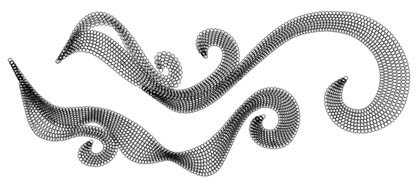 One day, Pulse's flat figure started muscling up, and he was bathed in purple. Geometrical calculations were applied rigorously like calisthenics. This would prepare him, he thought, for the "extrusion of two-dimensional materials into a three-dimensional pattern and flow to accentuate ornamentation through structure and volume without infrastructure." As the tendril became progressively feverish from exhaustion, he heard a distant voice shriek, "That's the color!" |
||||
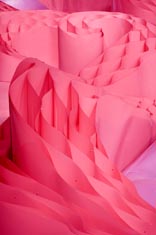 |
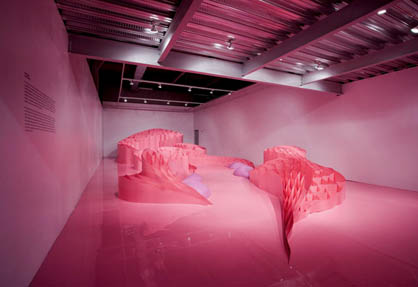 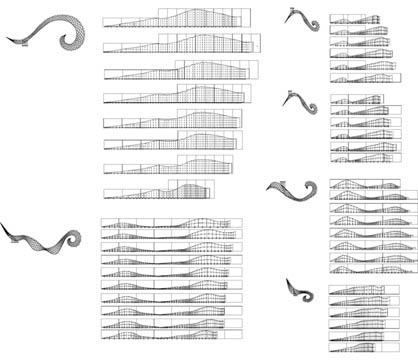 He proceeded to be flushed in Magenta 67, which made him loop up like a Richard Serra torque and transform to five paisleys in 4' x 8' increments. It was fortuitous for, at that moment, all other schematics conceded to Pulse, who had already remained front and center on the desktop for hours. With the addition of a Junya Watanabe-inspired frill, the competition was crushed. Pulse was pinched at the front like one of her complex ruffles for a built-in corrugation. |
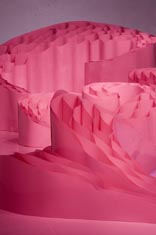 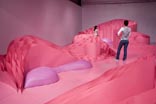 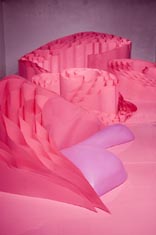 |
||
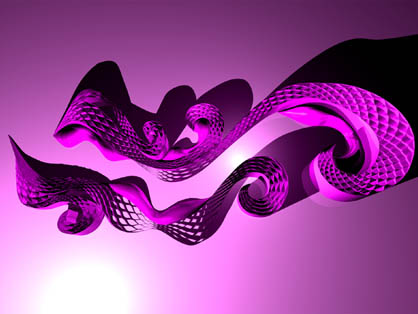 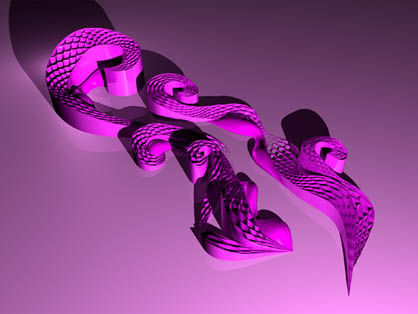 Plastic and vinyl, along with high-density foam, were hauled into SCI-Arc. Pulse peered out from the interface window, when suddenly an inversion took place, and he found himself tossed to the other side, looking out at a screensaver. Physical fabrication was a massage compared to the mental gymnastics and tendril abuse he had grown used to in Maya. Liberated, he coated the entire gallery space pink with a burst. Remembering to be as polite and ornamental, as performative, however, he assumed a moody, atmospheric pose to accentuate his five-part continuous surface. Bruna Mori |
||||
| FLORENCIA
PITA. Pulse: Tendril Formations |
||||
 SCI-Arc (Southern California Institute of Architecture), April 7 to May 21, 2006. design: Florencia Pita lighting consultant: Heather Libonati |
||||
| Per
candidare progetti laboratorio
|
|||||